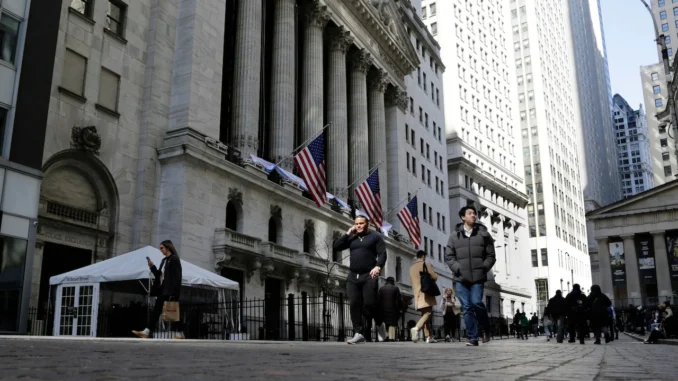
Billions were wiped off the value of US lenders last night as aftershocks from the collapse of Silicon Valley Bank (SVB) continued to rattle the markets.
State Street, one of America’s oldest banks, saw its share prices tumble after revealing that clients had pulled tens of billions of dollars at the start of the year.
Customers withdrew $26bn from State Street’s investment products in the first quarter. Shares in the Boston-based company fell as much as 18pc – its worst intraday tumble since the early days of the pandemic in 2020.
Meanwhile, stockbroker Charles Schwab said $41bn had been pulled from its accounts during the first three months of 2023. The company blamed “regulatory uncertainty” following the collapse of SVB in March and the emergency rescue of Credit Suisse in Europe shortly thereafter.
Schwab’s results also revealed it had bolstered its finances by borrowing $45.6bn from the Federal Home Loan Bank system – a move sometimes viewed as a sign of financial stress.
Chief executive Walt Bettinger played down recent instability, telling investors: “As storms come, storms also go.”
Shares in the broker, which are down by more than a third so far this year, initially dipped in New York before climbing 3pc.
News of the withdrawals sparked concerns at other US banks. Northern Trust was down 6pc and BNY Mellon fell 7pc.
The downbeat figures fuelled fears that the US financial system could experience further turbulence in the wake of the worst banking crisis since 2008.
Jane Fraser, chief executive of Citigroup, last week warned that the US will fall into recession this year while JP Morgan boss Jamie Dimon said there were “storm clouds” gathering in the wake of the recent banking crisis.
Regulators around the world are considering tightening the rules in light of the recent rapid bank run that brought down SVB.
Chancellor Jeremy Hunt and Bank of England Governor Andrew Bailey are both assessing whether to extend Government guarantees on bank deposits in order to give customers more confidence that their money is safe.
Deposits of up to £85,000 are covered in Britain today. Mr Bailey is understood to be open to increasing that ceiling to limit the impact of social media-fuelled bank runs.
Andrew Griffith, economic secretary to the Treasury, said he and his officials were “working with the Bank to constantly look at whether you’ve got the right threshold and the right scope”.
John Vickers, the economist who helped to draw up Britain’s financial regulation in the wake of the 2008 crisis, said banks should be forced to hold more cash if government guarantees were increased.
He told Bloomberg: “If the state is more on the hook, the quid pro quo is that there has to be a lower risk of insolvency and the only sure way of achieving that is more common equity capital.”
Instability for US bank stocks came at the start of a busy week for earnings in the sector. Several regional banks are scheduled to update on how they have fared so far this year, with concern over how serious the fallout from SVB may have been for smaller lenders.
JP Morgan and Citigroup last week delivered better-than-expected figures, in part thanks to an influx of deposits from customers fleeing smaller institutions.
